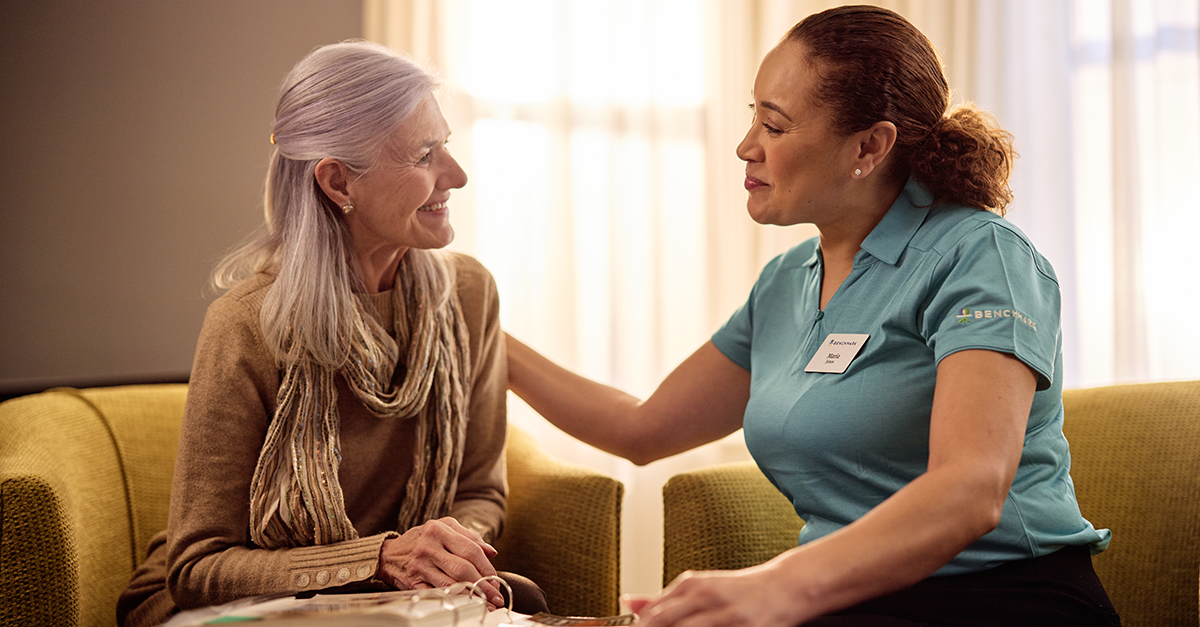1 in 4 Seniors Face Isolation – But It Doesn’t Have to Be This Way

May is Mental Health Awareness Month, a reminder that emotional well-being matters at every age. When we talk about aging and wellness, we often focus on the physical aspects such as nutrition, mobility, and chronic conditions but senior mental health is just as important and deserves the same attention and care.
Whether someone is aging at home or in an assisted living community, having access to emotional support systems can make a world of a difference in how they feel; and in how they can live their best life.
What Is Mental Health and Why Does It Matter for Seniors?
Mental health includes emotional, psychological, and social well-being. It shapes how we think, feel, connect with others, and handle stress. Social isolation and loneliness affect about one in four older adults, and “are key risk factors for mental health conditions in later life” (World Health Organization (WHO)).
If left unaddressed, loneliness can have serious effects on mental health, from depression and anxiety to serious cognitive decline.
Poor mental health, loneliness, and social isolation don’t just impact mood—they can lead to other health risks as well. According to the National Institute on Aging, social isolation has been linked to high blood pressure, heart disease, stroke, Alzheimer’s, and a weakened immune system. It can even be as harmful as smoking 15 cigarettes a day (Consumer Affairs).
The good news? With the right programs, conversations, and care, mental health and wellness in seniors can be supported at any stage of aging.
Why The Need to Raise Awareness?
“Mental health conditions among older people are often underrecognized and undertreated” (WHO), and more awareness helps fight back against this reality.
Many seniors may be less likely to speak up or seek help, especially if they grew up during a time when mental health wasn’t openly discussed. Awareness reduces stigma, helps families and caregivers to get involved and educated, and encourages people to seek support before issues escalate.
When families know what to look for, they’re better prepared to step in early. And when seniors feel seen and heard, they’re more likely to speak up and ask for help.
Signs of Mental Health Issues in Seniors
For seniors, changes in mental health may be subtle and easy to miss. Some signs may include:
- Noticeable shifts in mood, energy level, or appetite
- Trouble sleeping or oversleeping
- Withdrawing from friends or favorite activities
- Expressing feelings of hopelessness or sadness
- Increased stress, anger, irritability, or aggressiveness
The most common mental health conditions for older adults are depression and anxiety. While these symptoms are sometimes mistaken for a normal part of aging, they could signal an underlying need for support.
How Can We Help Senior Mental Health
Combating loneliness starts with connection. According to the WHO, “meaningful social activities can significantly improve positive mental health, life satisfaction, and quality of life.” Family members and caregivers can support senior mental health by:
- Checking in regularly, in person or virtually
- Encouraging group activities, hobbies, or walks
- Watching for changes in mood, energy or behavior
- Encouraging connection. Even one meaningful interaction a day can help someone feel less alone.
- Creating space for conversation—asking “How have you been feeling lately?” can lead to open conversations about how they are feeling
- Seeking support early. Don’t wait for a crisis to happen. Learn more at NIH.gov
And when it’s time for extra support, assisted living can offer the structure, connection, and attention needed to thrive—not just physically, but emotionally too.
How Does Benchmark Support Senior Mental Health?
At Benchmark Senior Living, our communities are designed around connection, purpose, and personalized care. We believe the smallest moments—sharing a meal, enjoying a walk, or laughing with a friend—can have the biggest impact. To us, mental health and wellness aren’t just buzzwords—they’re part of everyday life.
No one has to feel alone at Benchmark. We believe in the power of relationships and create spaces where seniors can build meaningful connections, feel a sense of belonging, and continue to grow. We prioritize connection-centered living, averaging 19 meaningful moments of connection each day with our associates. These interactions help residents feel seen, heard, and valued—each essential to emotional health. And these interactions don’t even include the friendships residents form with one another, the daily conversations, shared experiences, and bonds that bring comfort, joy, and community. At Benchmark, we know that true well-being starts with feeling connected.
We also take the time to get to know our residents and watch for mental health issues if they develop. Our care teams are specially trained to recognize the signs of mental health issues, which are all too common in seniors. No one has to navigate these challenges alone at Benchmark—we’re here to support every resident with compassion, understanding, and care.
Because connection is essential for everyone, including those living with memory loss, our award-winning Mind & Memory Care program offers personalized support to help residents stay engaged, connected, and emotionally supported. With care rooted in understanding and compassion, we help individuals continue to find joy and meaning each day.
If you’re wondering whether it might be time for more support, Benchmark is here to help. Our team is ready to listen, guide, and walk with you each step of the way. Reach out to a Benchmark community near you.
Find out what a Day in the Life at Benchmark Senior Living looks like.
Sources:
https://www.nimh.nih.gov/health/topics/older-adults-and-mental-health
https://www.who.int/news-room/fact-sheets/detail/mental-health-of-older-adults


